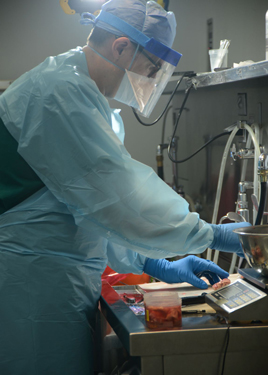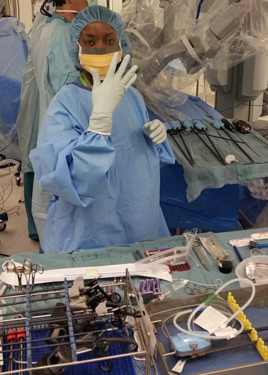Two part-time JD students help region respond to pandemic in their roles as medical professionals
Pursuing a law degree while working a full-time job is a herculean undertaking even in the best of times. It’s that much more difficult when your job happens to be in the medical field during the most severe global pandemic in a century.
That’s the position in which two students in Seattle University School of Law’s Part-Time JD Program find themselves: J. Matthew Lacy, MD, chief medical examiner of Snohomish County, and Tracie Newbins, a surgical technologist at Harborview Medical Center. Both are part of a caring and dedicated healthcare workforce that is providing crucial care to those who have contracted the virus while working to mitigate the spread of COVID-19, all while bravely risking their personal health.

Lacy has had to balance his law studies with a full-time job that has become vital – but also extremely hectic and dangerous – during the pandemic. If someone dies from a possible COVID-19 infection, Lacy’s office is called on to confirm the cause of death and then works to see who may have been in contact with the deceased, in order to limit the spread of the virus.
“We certified the first coronavirus death of a previously undiagnosed person who died at home in early March. At the time, there were no other reports of community deaths in the country,” he said. “The experience so far has been full-on and exhausting at times. It’s been extremely busy.”
As a result of autopsies he has performed, Lacy has gleaned important information about the virus’s pathology, which he communicates to researchers who are working to develop a vaccine. “For example, we have found that certain patients are at a much higher risk of blood clots due to the virus, which may cause a more deadly course.” He added that there is still much that is unknown about the effects of COVID-19.
Lacy has also written a paper titled, “Biosafety Considerations During the Investigation of COVID-19 Deaths,” which will be published by the journal Academic Forensic Pathology.
Like so many other medical centers across the country, Lacy’s office has confronted a shortage of personal protective equipment, such as masks and gloves. “We were down to our last four boxes of respiratory masks. We were worried we wouldn’t be able to keep the doors open.” Luckily, he was able to locate two reusable powered air purifier respirators, limiting the need for disposable masks.
Lacy was drawn to law school in part due to the legal issues he regularly encounters in his role as a medical examiner, forensic pathologist, and head of a county agency, including matters dealing with contracts, evidence, and criminal law. For example, he frequently testifies about his cause of death determinations in criminal cases. “Having a legal background will help me deal with these issues,” he said.
Lacy has experience working in a crisis: he began a fellowship with the New York City Office of Chief Medical Examiner on Sept. 10, 2001. The next day, terrorists attacked the World Trade Center, and the medical examiner’s office was flooded with the bodies of victims, including firefighters, police officers, and bystanders.
After assuming his current role in January, Lacy has had to lighten his course load, but he looks forward to getting back on campus in the near future to continue making progress toward his law degree. “I’ve really enjoyed my experience in the part-time program,” he said. “I have been super impressed with my classmates. I’ve learned as much from them as I have from the courses.”

Newbins, a fellow part-time student, is set to graduate this spring and transition to a legal career, but not before she lends a vital hand to Washington state’s response to the coronavirus outbreak. Her job is to assist surgeons on a variety of procedures where many of the patients have tested positive for COVID-19, which means she risks exposure to the virus every time she goes to work.
“It’s nothing like what has been going on in New York, but it’s still very nerve wracking,” she said.
To protect herself and her 15-year-old son, she has adopted more stringent protocols. “I’m doing my best to minimize the risk,” she said. “At home, I immediately take off my clothing at the door and put it in the washing machine. I also do a lot of disinfecting.”
Newbins is used to juggling a variety of roles – health care worker, single mom, and law student – but she’s also had to become a teacher and cheerleader to her son as they both try to keep up with their schoolwork in the midst of this crisis.
“It’s been difficult. I can’t go somewhere else to study,” she said. “It’s hard to find time by myself, uninterrupted.”
Graduation will mean a complete career change for Newbins, as she plans to build a law practice serving low-income and underrepresented populations.
